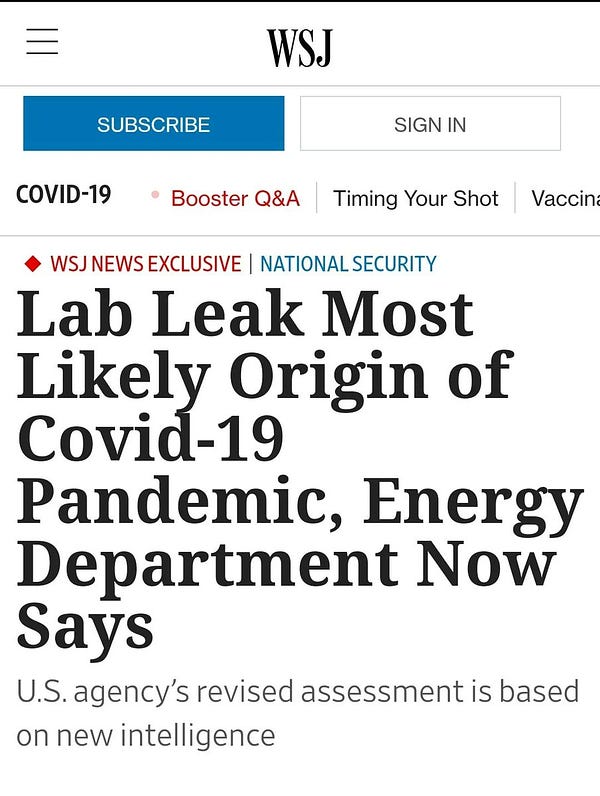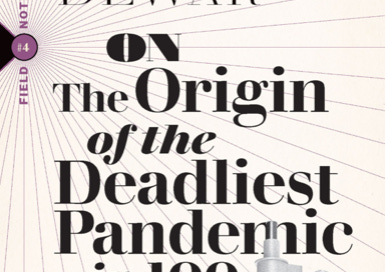Weekend reads: On following the science
The lab leak theory, masks - and why the media needs more viewpoint diversity
When I speak to people in the pubic about declining trust in media, one story that’s frequently cited as a turning point is the lab leak theory. The idea that SARS-CoV-2 may have escaped during a lab accident at the Wuhan Institute of Virology was, for at least the first year of the pandemic, either ignored by the mainstream press or dismissed as a conspiracy theory.
The dominant view for many months was that the pandemic had zoonotic origins, with the virus jumping from animal to human, likely at a Wuhan wet market. And, as New York Times Covid reporter Apoorva Mandavilli put it in a since-deleted tweet, that the lab leak theory had “racist roots.”
But the lab leak hypothesis was always plausible, and recent reporting has shown that scientists with conflicts of interest suppressed discussion on it.
EcoHealth Alliance head Peter Daszak is one of the scientists behind the famed Lancet letter denouncing the lab leak hypothesis as “rumours,” “misinformation” and “conspiracy theories,” and an investigative researcher on the origins of the pandemic for the World Health Organization. But Daszak is no neutral observer. EcoHealth Alliance has, in fact, funded the Wuhan Institute of Virology, which performed “gain-of-function” research to make coronaviruses more pathogenic or transmissible. (You can read more on the suppression of the lab leak theory at the new independent media outlet, Public, in this piece by Michael Shellenberger and Lean Out guest Leighton Woodhouse.)
It’s worth noting that a veteran journalist in Canada was among the first to break from the pack and seriously explore this question of the origins of the pandemic. Toronto reporter Elaine Dewar began looking into it in early 2020 and published an exhaustively researched book in August of 2021. (You can listen to my podcast interview with Dewar here.)
The tide has very much turned, with in-depth reporting on the lab leak theory appearing in Vanity Fair and many other mainstream outlets.
And now, The Wall Street Journal has reported that, based on new evidence, the U.S. Energy Department has concluded — albeit with “low confidence” — that the virus most likely leaked from a lab. The FBI had previously reached the same conclusion, with “moderate confidence.”
It’s interesting to watch how different media are handling what can only be described as a journalistic failure. Some outlets are correcting course (albeit without mea culpas), while others, such as NPR and MSNBC’s Mehdi Hassan, are doubling down.




Meanwhile, Jonathan Chait, in his piece at New York Magazine, “The Surprisingly Contrarian Case Against Lying About Science,” points out that “many left-wing culture warriors continue to treat legitimate scientific questions as tantamount to crank beliefs.”
One of the examples he provides is telling:
“The media treated the lab leak as a conspiracy early in the pandemic because the people pushing it were conspiracy theorists. Zero Hedge, Trump, deranged message boards,” insists podcaster Michael Hobbes. “Plus, we don’t even have evidence that the lab leak is true! You can’t scold the media for ‘suppressing debate’ about something that eventually turns out to be false. False things should be suppressed!”
This is an extremely bizarre view of how the media should cover scientific controversies. It is often the case that scientists propose competing hypotheses to explain a phenomenon, and eventually enough evidence materializes to prove one or more of the hypotheses false. Hobbes is apparently arguing the media is correct to label a hypothesis as false, or even as a racist conspiracy theory, as long as the hypothesis is eventuallydisproved — and since the lab-leak hypothesis might eventually be disproved, there’s no proven harm in suppressing it.
Obviously, it becomes more difficult to prove a hypothesis if the national media has run a series of articles claiming anybody who even entertains it is a racist crank. In any case, I prefer the media to honestly portray the state of scientific knowledge, rather than inventing a nonexistent consensus and hoping it all works out.
The reality of the situation, Chait points out, “was that scientists disagreed, and continue to disagree, about the virus’s origins. Science by its nature contains disagreements, which even when they grow personal and bitter are supposed to be resolved through evidence and reason.”
“The temptation to use ideological criteria to settle scientific questions is one that ultimately poses a threat to science itself,” he concludes. “The correct way to follow the science is to actually follow it — not to use it as a mascot or as a justification to place your own views beyond criticism.”
It would be hard to overstate how much of a relief it is to read this position articulated this frankly, particularly in a mainstream outlet.
One of my great frustrations during the Covid-19 era was how uncritical the press was on pandemic coverage. Pretty early on, there were signs that our public policy may not stand up to scientific scrutiny.
So often, media took the statements of government officials and experts at face value. But government officials and experts are human beings, and thus are capable of making mistakes, whether driven by exhaustion, ideology, panic, conformism, or conflicts of interest — as the lab leak debacle so well illustrates.


Many will now concede that vaccine mandates were not supported by scientific evidence, and were a divisive and counterproductive public health disaster that may drive vaccine hesitancy for years to come. Natural immunity, meanwhile, has been established. Very few would still defend lockdowns. Or school closures, which disproportionately harmed the most vulnerable children in our society. And the Twitter Files have highlighted some of the online censorship that limited discussion and debate on these important issues, which were very much in the public interest.
For a catalogue of the errors promulgated, see this piece from surgeon, public policy researcher at Johns Hopkins, and Washington Post contributor, Dr. Marty Makary, who testified before Congress this past week.
I thought about all of this when the recent Cochrane study on masking was published. Tom Jefferson, the Oxford epidemiologist and lead author, had this to say about its findings: “There is just no evidence that they make any difference. Full stop.”
Bret Stephens makes important points on the implications of this in The New York Times:
… mask mandates were a fool’s errand from the start. They may have created a false sense of safety — and thus permission to resume semi-normal life. They did almost nothing to advance safety itself. The Cochrane report ought to be the final nail in this particular coffin.
There’s a final lesson. The last justification for masks is that, even if they proved to be ineffective, they seemed like a relatively low-cost, intuitively effective way of doing something against the virus in the early days of the pandemic. But “do something” is not science, and it shouldn’t have been public policy. And the people who had the courage to say as much deserved to be listened to, not treated with contempt. They may not ever get the apology they deserve, but vindication ought to be enough.
Not that long ago, anyone who questioned the mask mandates was smeared as fringe.
This would have been far less likely to happen if the media was functioning properly — if there was a healthy amount of viewpoint diversity in newsrooms. Viewpoint diversity pits bias against bias, forces debate, demands discussion, calls for evidence, and fuels critical thinking.
If groupthink on stories like the lab leak and mask mandates got us into this mess, viewpoint diversity is what will get us out of it.





“many left-wing culture warriors continue to treat legitimate scientific questions as tantamount to crank beliefs.”
Yes, but these are radical activists who telegraph opposition to real science and their methods replacing objective truth and facts with relative political power plays. We expect that from them.
It isn't THOSE people that deserve our ire or stronger response... it is our officials and professionals we have entrusted with a level of duty of care within their professional lane. For example, Anthony Fauci should be in prison for what he has done. So should several other officials in NHI and the CDC.
Thank you for compiling this in one place Tara. I wish I felt more vindicated and less...sad
Yes sure it’s the governments fault...but we can’t expect much but further lies out of our government now. Who’s fault is that?
It’s very important that independent press is growing. A breath of fresh air.
But our real focus needs to be on the population, ourselves, our neighbours, friends, the children, upholding critical thinking, civic debate, reducing siloing, cancel culture and mental health issues so people can find true community and ask difficult questions again.
It starts with the kids...